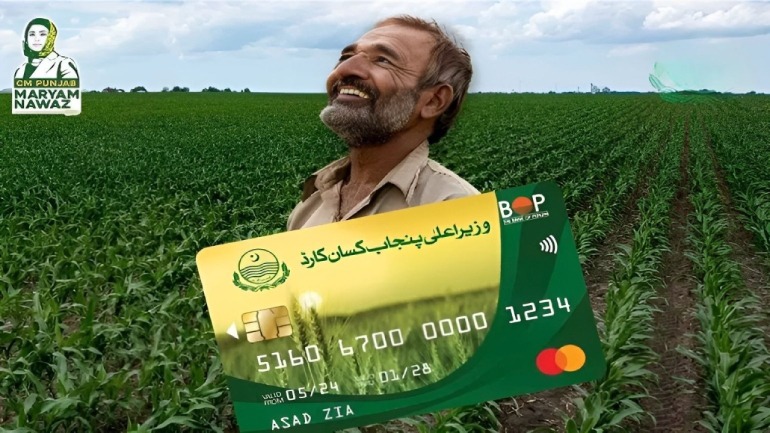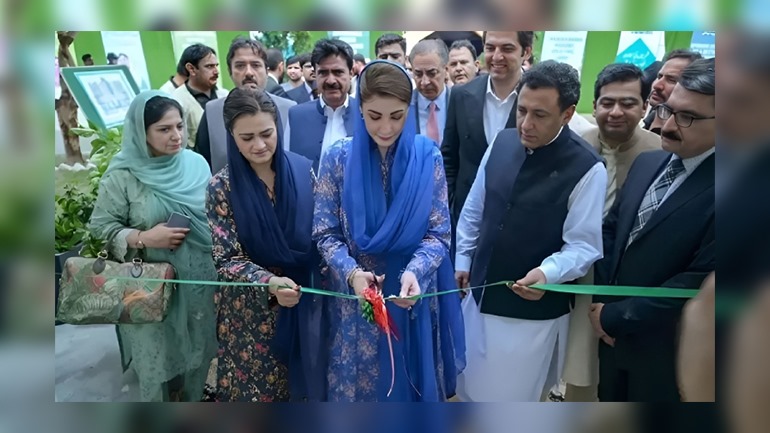

He wheat harvest in Punjab has begun, marking a crucial season for Punjab wheat farmers. For farmers in Punjab, wheat is one of the most important crops, deeply tied to rural culture in Punjab, along with various social and cultural festivities. However, this time around, farmers appear to be worried about their crop, highlighting a growing agriculture crisis in Punjab. Last year, the Punjab government's wheat policy included a fixed wheat support price in Punjab, but this year, no such wheat crop price in 2025 was announced, nor did the government proceed with Punjab wheat procurement. As a result, wheat prices dropped in Pakistan, prompting farmers’ protests, especially across major cities in Punjab. Sensing the gravity of the situation, the CM of Punjab announced a wheat relief package for 2025. But what does this package include, and to what extent will it help the farmers? Before we get into that, let’s take a look at other projects launched by the Punjab government
If we assess Maryam Nawaz’s public welfare initiatives during her current tenure, they amount to over 80 projects. The Pakistan Muslim League-N (PML-N) claims that these public initiatives by Chief Minister Maryam Nawaz are directly benefiting millions of people in Punjab. Punjab’s Information Minister, Azma Bukhari, claims that "Chief Minister Maryam Nawaz has launched over 80 projects within a year, more than 50 of which have already been completed." On the other hand, critics argue that through these projects, the PML-N is attempting to gain political support within the province. It’s worth noting that some of these projects target rural areas of Punjab, while others extend to urban regions as well. One particularly popular project is “Suthra Punjab” (Clean Punjab). Initially focused on rural areas, its scope has now been expanded to urban centers. According to the Punjab government’s data, this project has also provided jobs to nearly 100,000 people. Similarly, during the holy month of Ramadan, the Punjab government launched the "Ramzan Nigehbaan Package", which, according to official statistics, provided financial assistance to 3 million people. Additionally, 8.5 million people benefited from Ramzan discount bazaars. Chief Minister Maryam Nawaz also launched the "Honahar Scholarship Program", under which the government claims 30,000 students have been awarded scholarships. She also distributed electric bikes to 27,000 students across the province. Under the "Dhee Rani Program", 1,500 underprivileged girls have been married off in the first phase, with the second phase set to begin soon. Furthermore, 130,427 livestock cards have been issued. In South Punjab, 3,664 cows and buffaloes have been distributed among women. According to the Punjab government, 750,000 farmers have received Kisan Cards, enabling them to make purchases worth over Rs. 50 billion. In addition, more than 10,000 green tractors and 1,000 super seeders have been distributed among farmers. Under the "Apni Chhat Apna Ghar" (My Roof, My Home) program, 20,000 people have received home loans of Rs. 1.5 million each, while under the "Asaan Karobar Program" (Easy Business Program), interest-free loans ranging from Rs. 1.5 million to Rs. 30 million have been disbursed among the youth.
As part of the wheat package announced by the Punjab government, one of the key components is the approval of Rs. 15 billion in direct support to 550,000 wheat farmers under the Wheat Support Fund. This package includes direct financial assistance through the Kisan Card, along with relaxation in water charges (Aabiana) and fixed agricultural taxes. To protect farmers from market pressures, the Chief Minister of Punjab also announced four months of free storage facilities for wheat and the implementation of the Electronic Warehouse Receipt (EWR) system. Additionally, the package includes a commitment from the government to pay the markup on loans, up to Rs. 100 billion, taken by flour mills and licensed grain holders from the Bank of Punjab for wheat procurement.

The Punjab government claims that it is providing extensive benefits to farmers. This claim is supported by various schemes related to farmers. Since the wheat harvest is ongoing in Punjab, there has been considerable discussion on social media about wheat prices. We attempted to gauge farmers' reactions to these schemes by speaking with several wheat farmers engaged in the harvest in Punjab. Overall, farmers in Punjab appear to be deeply dissatisfied with the government. They view these schemes as a waste of money and time, arguing that they are not new and, apart from benefiting a few individuals, they do not address the larger issues faced by farmers. Discussing the government's wheat package, young farmer Waqas Ahmad from Sargodha District says that the direct financial support under the Kisan Card is not available to farmers with less than 12.5 acres of land. "For the smaller farmers who do receive it, the support is minimal—out of 300 small farmers, only about 20 to 25 receive the card," he says. Waqas Ahmad also pointed out an important issue, referring to the wheat procurement process. He mentions that flour mills and green license holders, whom Maryam Nawaz herself has called a "mafia," benefit from the system. "Green license holders will buy wheat from farmers and store it, then take loans from the Bank of Punjab. They will profit, while small and medium farmers like me are in desperate need of money right now. We cannot afford to store our crops for even a month, let alone three or four months." Sayed Jafar Gilani, a farmer from Lodhran, states, "The Punjab government claimed in this package that they are waiving the water charges (Aabiana), but they already forcibly collected it from us in March." He further criticizes the complex process involved in accessing relief from such packages. His concerns are echoed by Khalid Khan Mirani, a farmer from Leiah District, who says, "The government has already collected the water charges. Farmers are not in a position to store wheat due to financial constraints. The real beneficiary of storage will be the investors." How do farmer organizations view this package? The Central Chairman of the Kisan Ittehad, Khalid Hussain, shared his views, saying that the Rs. 15 billion allocated for 550,000 farmers translates to only about Rs. 2,700 per farmer. He also pointed out that the Electronic Warehouse Receipt (EWR) system, which is in place across 28 European countries, may work there because it benefits large-scale farmers, but in Pakistan, most farmers own only 5 to 7 acres of land. For them, this system cannot provide real relief. He concluded, "We reject this package. We demand better wheat prices and direct procurement." Chaudhry Niaz Mohammad Nambardar, a farmer from Toba Tek Singh, remarked that despite the government’s schemes, "farmers remain restless." He believes that providing affordable agricultural machinery is a more important issue than the current schemes. Similarly, farmers from Sialkot, Kasur, Okara, Sahiwal, Pakpattan, Khanewal, Multan, Leiah, Rahim Yar Khan, Bhakkar, and Muzaffargarh have also expressed similar sentiments.
On the other hand, the "Suthra Punjab" (Clean Punjab) scheme, which initially focused only on rural areas, has now expanded its scope to include urban areas as well. Despite some reservations about the project, it is largely appreciated. Similarly, the operation against encroachments is being praised, but there is also concern that its implementation at the grassroots level seems to be somewhat slow. There is a significant need for this operation in rural areas at the social level. Ihsan Gondal, the Nambardar (village head) from Gadhi Abdullah in Hafizabad, says, "Under the Suthra Punjab initiative, cleanliness is maintained in our village, but the operation against encroachments has been limited to cities and towns so far." He adds that this operation is urgently needed in villages as well. Chaudhry Niaz Mohammad from Toba Tek Singh states that while the Clean Punjab initiative is highly commendable, the government should pay even more attention to removing encroachments in rural areas. This would help provide modern living facilities to people and reduce the trend of migration from villages to cities. He explains, "When the chak (land division) designs were made, the roads were meant to be 56 feet wide, but due to encroachments, they are now restricted to just 20 feet." Shahzad Ranjha, an advocate from Fatowala village in Mandi Bahauddin, says that the Clean Punjab initiative and the operation against encroachments are benefiting people directly. People in various villages wish to see this operation expanded. They mention that even minor encroachments on streets and roads are sometimes not even addressed by powerful local figures, leading to major conflicts over such issues. Meanwhile, the Dhee Rani Program and the scheme providing cows and buffaloes to rural women in South Punjab have received social appreciation. Arif Ali, who works in Sheikhupura making naan and tikki (a type of bread), shares his story: "I used to sell naan and tikki from a cart, but with a little help from a kind person, I set up a small shop. Some days I earn 700 rupees, other days 500 rupees. I have six daughters. I used to wonder how I would marry them off with dignity, but when my eldest daughter got married with honor, it brought me peace of mind." Komal Naz from Muzaffargarh, who has two young children and an elderly mother, says, "Since receiving a buffalo from Maryam Bibi, I have felt at ease. A few days ago, I fell ill, and a government doctor came to check on me. Now my buffalo is perfectly fine."
Most of the projects initiated by the Punjab government are not new; similar schemes and initiatives have been introduced during various previous administrations. Therefore, mixed reactions are often observed regarding these projects. So, are Maryam Nawaz's projects gaining political support in rural areas for the PML-N? Ijaz Parvia, a senior lawyer and PML-N leader from Wazirabad, states that there is widespread disappointment in the villages. "Even though the Prime Minister announced cheaper electricity, I haven’t seen anyone in the villages express any satisfaction about it." He adds, "The schemes are good, and perhaps over time, they might have some impact." Mian Ijaz Bhatti, a former MPA from Nankana and a member of the PML-N, mentions that as long as inflation is not reduced, these projects won’t have any real benefit. Master Muhammad Farooq from Sahiwal says that those who benefit directly from the government's schemes still do not consider these projects to be long-term solutions to their problems. Nasir Ali Khan, a landowner and political activist from Bhakkar, believes that if we focus only on farmers, a large number of them see the government’s policies as being anti-farmer. Akmal Shehzad Ghumman, a writer and farmer from Sialkot, also says, "These schemes are not new. In the 1990s, our family received a tractor through Benazir Bhutto’s scheme. Lottery-based schemes are merely political tactics." Anwar Mahota Advocate from Multan, believes that while these programs do offer direct solutions to the rural and underdeveloped areas of South Punjab, they seem to be short-term populist measures. However, some people don’t overlook the social and political effects of these schemes and projects. Ghulam Yaseen Waghara, a landowner from Khushab, says that people were facing significant financial challenges in sowing wheat, but it was thanks to the Kisan Card that they were able to plant wheat

Amiran Bibi from Khushab says that whenever women in their area receive financial assistance for women from the current government, they refer to it as "receiving Benazir Income Support Fund money." A similar sentiment is expressed by Aqeel Lodhi from Wazirabad, who mentions that those benefiting from Maryam Nawaz's financial schemes consider it to be part of the "Benazir Income Support Fund." When we spoke to various people, the consensus was that Maryam Nawaz might not have been successful in registering women under her government relief programs yet. Chaudhry Abid Raza Kotla, a senior PML-N leader from Gujrat, says that people's mindset has changed significantly, and now, when they receive relief, they see it as their right to do so, highlighting the shift towards women's empowerment in Punjab and the ongoing political impact of welfare schemes in rural areas.
Powered by Froala Editor